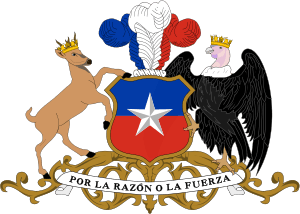Chile–India relations
 |
|
Chile |
India |
|---|---|
Chile–India relations refer to foreign relations between Chile and India
High level visits
mechanism of Foreign Office level consultations was initiated in Santiago in August, 2000, and was followed up with a second meeting in New Delhi in April, 2003. However, high-level political exchanges have been few and far between. Prime Minister Indira Gandhi visited Chile in 1968, Transport and Communications Minister K.P. Unnikrishnan in 1990, and President Shankar Dayal Sharma in 1995. From the Chilean side, there has not been any HOS/HOG visit to India. As an indication of Chile’s interest in an enhanced relationship, the Chilean Minister of Agriculture visited India in December, 2001.
The Chilean Vice Minister of Economy Mr. Alvaro Diaz visited India on 10–12 November 2002, and the Minister for Mines, Mr. Alfonso Dulanto, visited India on 13–15 November 2002. Foreign Minister Maria Soledad Alvear’s visit from 24–25 April was the first bilateral official visit to India by a Chilean Foreign Minister after a gap of 46 years.
Trade Relations
Chile was the first country in South America to sign a trade agreement with India, in 1956
Indians in Chile
The Indian community in Chile numbers around 1000+, mostly residing in Santiago, Iquique, Viña del Mar, and Punta Arenas. Largely engaged in small business and trade, the community is gradually being assimilated into the mainstream through naturalisation. An average of 1000 Chileans visit India annually, mainly for tourism.
Cultural ties
Indian culture is highly regarded and appreciated in Chile. Yoga is widely practised there. Santiago hosts 16 yoga training centres. Four monuments have been raised to honour Mahatma Gandhi: one in Santiago, erected in 1968, one in Curico, erected in 1999, one in Sagrada Familia in May, 2002, and one in Rancagua in April, 2003. A fifth monument of Mahatma Gandhi is expected to be erected shortly in Valparaiso, a port city recently declared by UNESCO as a World Heritage Property. To give effect to a Bilateral Cultural Agreement signed in 1993, a Cultural Exchange Programme for the years 2003-2005 was signed in New Delhi in April, 2003. The CEP is now under implementation.

